Entry-Level Banking Position Cover Letter
Subject: Application for [Position Title] - [Your Name]
Dear [Hiring Manager's Name],
I am writing to express my strong interest in the [Position Title] position at [Bank Name]. As a recent graduate with a degree in [Finance/Business/Economics] from [University Name], I am eager to begin my career in banking with an institution known for its commitment to customer service and financial innovation.
During my academic career, I completed coursework in financial analysis, accounting principles, and risk management, which has provided me with a solid foundation in banking operations. My internship at [Company Name] allowed me to develop practical skills in customer relations, data analysis, and financial reporting. I successfully assisted in processing over 200 client transactions while maintaining 100% accuracy in documentation.
I am particularly drawn to [Bank Name] because of your recent initiatives in digital banking and your reputation for developing young talent. I am confident that my analytical skills, attention to detail, and passion for the financial services industry make me an excellent fit for your team.
I would welcome the opportunity to discuss how my background and enthusiasm can contribute to [Bank Name]'s continued success. Thank you for considering my application.
Sincerely,
[Your Name]
[Phone Number]
[Email Address]
Experienced Banking Professional Cover Letter
Subject: Application for [Position Title] - [Your Name]
Dear [Hiring Manager's Name],
With over [X] years of progressive experience in retail and commercial banking, I am excited to apply for the [Position Title] role at [Bank Name]. My proven track record of exceeding sales targets, managing high-value client portfolios, and leading successful teams aligns perfectly with the qualifications you seek.
In my current role as [Current Position] at [Current Bank], I have managed a portfolio of 150+ commercial clients with combined assets exceeding $50 million. I increased revenue by 35% through strategic cross-selling initiatives and developed new banking products that improved customer retention by 22%. Additionally, I led a team of six relationship managers, implementing training programs that elevated team performance by 40%.
[Bank Name]'s commitment to innovation in financial services and community development resonates deeply with my professional values. I am particularly impressed by your recent expansion into sustainable finance and would be thrilled to contribute my expertise in client relationship management and business development to support these initiatives.
I look forward to discussing how my experience and strategic vision can drive growth and excellence at [Bank Name].
Best regards,
[Your Name]
[Phone Number]
[Email Address]
Banking Internship Application Letter
Subject: Summer 2026 Banking Internship Application - [Your Name]
Dear [Internship Coordinator's Name],
I am writing to apply for the Summer 2026 Banking Internship at [Bank Name]. As a [Year] student majoring in [Major] at [University Name], I am seeking a challenging opportunity to apply my academic knowledge while gaining hands-on experience in the banking industry.
My coursework in corporate finance, investment analysis, and financial modeling has equipped me with technical skills that I am eager to apply in a real-world setting. As President of the Finance Club at [University], I organized workshops on financial literacy and coordinated networking events with industry professionals, demonstrating my leadership abilities and commitment to the field.
I am particularly interested in [Bank Name]'s internship program because of its reputation for mentorship and the opportunity to work on meaningful projects. I am a quick learner, detail-oriented, and passionate about understanding the complexities of modern banking.
Thank you for considering my application. I would be grateful for the opportunity to contribute to your team while developing my skills under your guidance.
Respectfully,
[Your Name]
[Phone Number]
[Email Address]
Career Change to Banking Cover Letter
Subject: [Position Title] Application - Transitioning Professional
Dear [Hiring Manager's Name],
I am writing to express my interest in the [Position Title] at [Bank Name]. After [X] years in [Previous Industry], I am making a strategic career transition into banking, bringing with me transferable skills in financial analysis, client management, and strategic planning that will add immediate value to your team.
In my role as [Previous Position] at [Previous Company], I managed budgets exceeding $[Amount], conducted financial forecasting, and built strong relationships with stakeholders across various sectors. These experiences have given me a comprehensive understanding of financial operations and risk assessment. Additionally, I recently completed certifications in [Relevant Certification] to strengthen my banking knowledge and demonstrate my commitment to this career path.
What attracts me to [Bank Name] is your innovative approach to customer service and your investment in employee development. I believe my unique perspective from [Previous Industry], combined with my financial acumen and client-focused approach, positions me to contribute fresh insights to your organization.
I would appreciate the opportunity to discuss how my diverse background can bring value to [Bank Name]. Thank you for your consideration.
Sincerely,
[Your Name]
[Phone Number]
[Email Address]
Banking Internal Position Transfer Letter
Subject: Internal Application for [New Position Title]
Dear [Hiring Manager's Name],
I am writing to formally express my interest in the [New Position Title] within [Department Name]. Having served as [Current Position] for [Duration] years, I have gained comprehensive knowledge of our bank's operations and culture, and I am excited about the opportunity to contribute to a new area of our organization.
During my tenure in [Current Department], I have consistently exceeded performance targets, earning recognition for [Specific Achievement]. I have developed strong relationships across departments and have a deep understanding of our customers' needs and our bank's strategic objectives. My experience in [Specific Skills/Projects] has prepared me well for the challenges and responsibilities of the [New Position].
I am particularly motivated to join [Department Name] because of its role in [Specific Reason]. I am confident that my institutional knowledge, proven track record, and enthusiasm for growth will enable me to make immediate contributions to the team.
I would welcome the opportunity to discuss this transition with you and demonstrate how my current experience aligns with the requirements of this role.
Thank you for your consideration.
Best regards,
[Your Name]
[Employee ID]
[Current Department]
Banking Position Referral Cover Letter
Subject: Application for [Position Title] - Referred by [Referrer's Name]
Dear [Hiring Manager's Name],
[Referrer's Name], [Referrer's Position] at [Bank Name], suggested I reach out to you regarding the [Position Title] opening. After learning about this opportunity and [Bank Name]'s exceptional reputation in the industry, I am enthusiastic about the possibility of joining your team.
I bring [X] years of experience in [Relevant Area], with particular strength in [Key Skills]. In my current role at [Current Employer], I have [Specific Achievement with Metrics]. My background in [Relevant Experience] aligns well with the requirements outlined in the job description, particularly in areas of [Specific Requirements].
[Referrer's Name] shared insights about [Bank Name]'s collaborative culture and commitment to innovation, which strongly resonates with my professional values. I am confident that my skills in [Key Skills] and my track record of [Specific Results] would make me a valuable addition to your team.
I would be delighted to discuss how my experience and enthusiasm can contribute to [Bank Name]'s continued success. Thank you for your time and consideration.
Warm regards,
[Your Name]
[Phone Number]
[Email Address]
Banking Executive Position Cover Letter
Subject: Confidential Application for [Executive Position Title]
Dear [Search Committee/Board Member's Name],
I am writing to express my interest in the [Executive Position Title] at [Bank Name]. With over [X] years of executive leadership in the financial services industry, I have a proven record of driving organizational growth, implementing strategic transformations, and building high-performing teams that deliver exceptional results.
As [Current Executive Title] at [Current Institution], I have led initiatives that resulted in [Specific Achievement with Metrics]. Under my leadership, the organization achieved [Specific Results], while maintaining the highest standards of regulatory compliance and risk management. My experience spans commercial banking, wealth management, and digital transformation, providing me with a comprehensive perspective on modern banking challenges and opportunities.
I am particularly drawn to [Bank Name] because of your strategic vision for [Specific Initiative/Goal] and your commitment to [Specific Value]. I believe my expertise in [Key Areas] and my track record of [Specific Accomplishments] position me to lead [Bank Name] through its next phase of growth while strengthening its market position.
I would welcome a confidential conversation to discuss how my leadership philosophy and strategic capabilities align with your organization's goals.
Respectfully,
[Your Name]
[Phone Number]
[Email Address]
What Are Banking Cover Letters and Why Do You Need Them
Banking cover letters are formal documents that accompany job applications for positions within financial institutions such as retail banks, investment banks, credit unions, and other banking organizations. These letters serve as your personal introduction to potential employers, providing context for your resume and demonstrating your communication skills, professionalism, and genuine interest in the specific role and institution. Unlike generic cover letters, banking cover letters must reflect an understanding of financial services, regulatory environments, and the specific competencies valued in the banking industry, such as analytical thinking, attention to detail, client relationship management, and ethical conduct.
Who Should Send Banking Cover Letters
- Recent graduates seeking entry-level positions in retail banking, commercial banking, or back-office operations
- Experienced banking professionals pursuing advancement opportunities or lateral moves to different institutions
- Career changers transitioning from related fields such as accounting, finance, insurance, or financial consulting
- MBA graduates targeting analyst or management training programs at major financial institutions
- Internal candidates applying for promotions or transfers within their current banking organization
- Professionals returning to banking after a career break or pursuing opportunities after organizational restructuring
- Executive-level candidates seeking senior leadership roles such as branch manager, regional director, or C-suite positions
- International banking professionals seeking opportunities in new markets or geographical locations
Elements and Structure of Banking Cover Letters
- Subject line or reference number: Include the specific position title and any job posting reference number for email applications
- Professional greeting: Address the letter to a specific person whenever possible using proper titles
- Opening paragraph: State the position you're applying for and how you learned about the opportunity
- Body paragraphs: Highlight relevant experience, specific achievements with quantifiable metrics, and skills that match job requirements
- Banking-specific competencies: Demonstrate knowledge of regulatory compliance, risk management, customer service excellence, and financial products
- Connection to the institution: Explain why you're interested in this particular bank and how your values align with theirs
- Closing paragraph: Express enthusiasm, request an interview, and provide clear contact information
- Professional signature: Include your full name, phone number, and email address
- Attachments reference: Mention your resume and any other supporting documents
- Length: Keep to one page, typically 3-5 paragraphs with 250-400 words
When to Send Banking Cover Letters
- When applying for advertised banking positions through online portals, company websites, or recruitment agencies
- During campus recruitment seasons if you're a student targeting summer internships or graduate programs
- When networking contacts inform you of unadvertised opportunities within their organizations
- After attending banking career fairs or industry networking events where you've connected with recruiters
- When applying for internal transfers or promotions within your current banking institution
- Following informational interviews that have led to potential job opportunities
- During active recruitment campaigns announced by banks expanding into new markets or opening new branches
- When executive search firms contact you regarding senior leadership opportunities
- After organizational restructuring creates new positions or when replacing departing staff
- When cold-applying to institutions where you have strong interest, even without advertised openings
Requirements and Prerequisites Before Writing Banking Cover Letters
- Research the specific bank thoroughly, including recent news, strategic initiatives, financial performance, and organizational culture
- Review the complete job description and identify key requirements, preferred qualifications, and essential competencies
- Prepare specific examples of achievements with quantifiable results that demonstrate relevant banking skills
- Gather information about the hiring manager or department head to personalize your greeting
- Update your resume to ensure consistency between the cover letter and your documented experience
- Obtain permission from references and inform them about the specific position you're pursuing
- Collect relevant certifications, licenses, or credentials required for banking positions in your jurisdiction
- Prepare your professional online presence, ensuring LinkedIn and other profiles reflect accurate information
- Identify mutual connections or alumni networks that might provide insights or referrals
- Understand regulatory requirements or background check processes common in banking recruitment
How to Write and Send Banking Cover Letters
- Begin with thorough research about the bank's mission, values, recent achievements, and strategic direction
- Analyze the job description to identify 3-5 key requirements that match your strongest qualifications
- Draft an attention-grabbing opening that immediately establishes your credibility and interest
- Use specific metrics and examples to demonstrate achievements rather than making generic claims
- Incorporate industry-specific terminology that shows your familiarity with banking operations
- Maintain a professional yet personable tone that reflects confidence without arrogance
- Customize each letter for the specific position and institution rather than using templates unchanged
- Proofread meticulously for grammar, spelling, and formatting errors, which are particularly detrimental in banking applications
- Save the document with a professional filename such as "YourName_CoverLetter_BankName_Position"
- Submit through the requested channel, whether online application system, email, or postal mail
- Follow formatting guidelines specified in the job posting regarding file type, subject lines, or document naming
- Keep a copy of each submitted cover letter for reference during potential interview preparation
Formatting Guidelines for Banking Cover Letters
- Length: Strictly one page with 250-400 words maximum to respect recruiters' time
- Font: Professional typefaces such as Arial, Calibri, or Times New Roman in 10-12 point size
- Margins: Standard one-inch margins on all sides for clean presentation
- Spacing: Single-spaced paragraphs with one blank line between paragraphs
- Tone: Professional and formal, avoiding casual language, slang, or overly creative expressions
- File format: PDF format preferred to preserve formatting across different systems
- Alignment: Left-aligned text for easy readability
- Contact information: Clearly displayed at the top or in your signature block
- Date format: Use formal date format appropriate for your region
- Paragraph structure: 3-5 paragraphs with clear topic sentences and logical flow
- Keywords: Incorporate relevant keywords from the job description naturally throughout the letter
- Proofreading standard: Zero tolerance for errors in banking applications due to industry emphasis on precision
Common Mistakes to Avoid in Banking Cover Letters
- Using generic templates without customization for the specific bank or position
- Failing to quantify achievements with specific metrics, percentages, or dollar amounts
- Exceeding one page or writing overly lengthy paragraphs that lose reader attention
- Focusing excessively on what you want rather than what you can contribute to the organization
- Including salary expectations or requirements unless specifically requested in the job posting
- Making spelling or grammatical errors, which are particularly damaging in detail-oriented banking roles
- Repeating resume content verbatim instead of providing context and interpretation
- Neglecting to research the bank's recent news, initiatives, or market position
- Using overly casual language or attempting inappropriate humor in formal banking communications
- Sending the same cover letter to multiple banks without changing institution-specific details
- Forgetting to update position titles, bank names, or other customized elements from previous applications
- Including irrelevant personal information or unrelated work experience
- Failing to address employment gaps or career changes that may raise questions
- Using unprofessional email addresses for contact information
Tips and Best Practices for Banking Cover Letters
- Start drafting your cover letter before the application deadline to allow time for multiple revisions
- Request feedback from mentors, career counselors, or banking professionals in your network
- Use the STAR method (Situation, Task, Action, Result) to structure achievement examples concisely
- Mirror the language and terminology used in the job description to pass applicant tracking systems
- Research the hiring manager on LinkedIn to understand their background and personalize your approach
- Demonstrate knowledge of current banking industry trends, challenges, or regulatory developments
- Emphasize soft skills highly valued in banking such as integrity, client service orientation, and teamwork
- Include specific examples of handling confidential information or demonstrating ethical judgment
- Mention relevant technology skills or experience with banking software and platforms
- Express genuine enthusiasm for the specific institution rather than just any banking job
- Use active voice and strong action verbs to convey confidence and competence
- Address potential concerns proactively, such as relocation willingness or availability start date
- Create a master cover letter with various paragraphs you can mix and match for different applications
After Sending: Follow-Up Procedures for Banking Cover Letters
- Record submission dates, contact information, and specific details about each application in a tracking spreadsheet
- Wait 7-10 business days before sending a follow-up email inquiring about application status
- Monitor your email and phone regularly for responses, ensuring voicemail is professional and mailbox not full
- Prepare for potential phone screenings by keeping your resume and cover letter readily accessible
- Continue applying to other opportunities rather than waiting passively for responses
- Send a brief, professional follow-up email reiterating your interest and highlighting one key qualification
- Connect with the hiring manager or recruiters on LinkedIn after applying, if appropriate for the organization's culture
- Prepare for interviews by reviewing your cover letter and being ready to expand on points mentioned
- Maintain professional communication standards in all follow-up correspondence
- Accept that banking recruitment processes can take several weeks to months, particularly for senior positions
- Send thank-you notes promptly after any interviews, referencing specific points from your cover letter and conversation
- Update your application materials if you receive new certifications or relevant experience during the waiting period
Pros and Cons of Sending Banking Cover Letters
Advantages:
- Provides opportunity to explain career transitions, employment gaps, or unique circumstances not evident in resumes
- Demonstrates writing skills, attention to detail, and professionalism highly valued in banking
- Allows you to show genuine interest in the specific institution and position
- Enables you to highlight most relevant qualifications that match the job requirements
- Helps you stand out from candidates who submit only resumes without personalized letters
- Offers a platform to address potential concerns proactively before the interview stage
- Shows initiative and thoroughness in your application approach
Disadvantages:
- Time-consuming to customize properly for each application
- May not be read thoroughly if recruiters focus primarily on resumes
- Risk of introducing errors that damage your candidacy if not carefully proofread
- Can be ineffective if poorly written or too generic
- Requires significant research for each institution to write meaningfully
- May be overlooked entirely in automated application systems that prioritize resumes
- Creates additional opportunity for inconsistencies between cover letter and resume if not coordinated carefully
Comparing Banking Cover Letters with Alternative Application Methods
Cover Letter vs. Resume Only: Resumes provide factual employment history while cover letters offer context, personality, and specific motivation. Banking employers typically expect both documents.
Cover Letter vs. Video Introduction: Video introductions are becoming popular for some entry-level positions but are rarely accepted for traditional banking roles where written communication skills are paramount.
Cover Letter vs. LinkedIn Application: LinkedIn easy-apply options expedite applications but lack the personalization and detail that cover letters provide, potentially reducing your competitive advantage.
Cover Letter vs. Networking Introduction: Personal referrals from network contacts are highly valuable but should still be accompanied by formal cover letters when submitting official applications.
Traditional vs. Email Cover Letters: Email cover letters may be shorter and slightly less formal but should maintain professional standards. The body of the email serves as the cover letter rather than sending a separate attachment.
Generic vs. Customized Cover Letters: Customized letters significantly increase interview chances despite requiring more time, as banking recruiters can easily identify generic templates.
Frequently Asked Questions About Banking Cover Letters
Should I mention salary requirements in my banking cover letter? Only include salary information if specifically requested in the job posting. Otherwise, save this discussion for later interview stages.
How do I address career gaps in my banking cover letter? Briefly acknowledge gaps positively by mentioning professional development, family responsibilities, or other constructive activities during that time.
Can I use the same cover letter for multiple banking positions? Never use identical letters. Customize each letter with specific institution names, position titles, and relevant details about that particular opportunity.
Should I mention if I'm willing to relocate for the position? Yes, explicitly state your relocation flexibility if the position is in a different city, as this addresses a common employer concern upfront.
How technical should my banking cover letter be? Match the technical level to the position. Entry-level letters should demonstrate foundational knowledge, while executive letters should reflect strategic understanding of banking operations.
Is it appropriate to mention connections within the bank? Absolutely. Mentioning referrals or mutual connections in your opening paragraph can significantly strengthen your application.
Should I explain why I'm leaving my current banking position? Keep explanations brief and positive, focusing on seeking growth opportunities rather than criticizing your current employer.
How do I address being overqualified for a banking position? Acknowledge your extensive experience as an asset and explain your genuine interest in the specific role and institution.
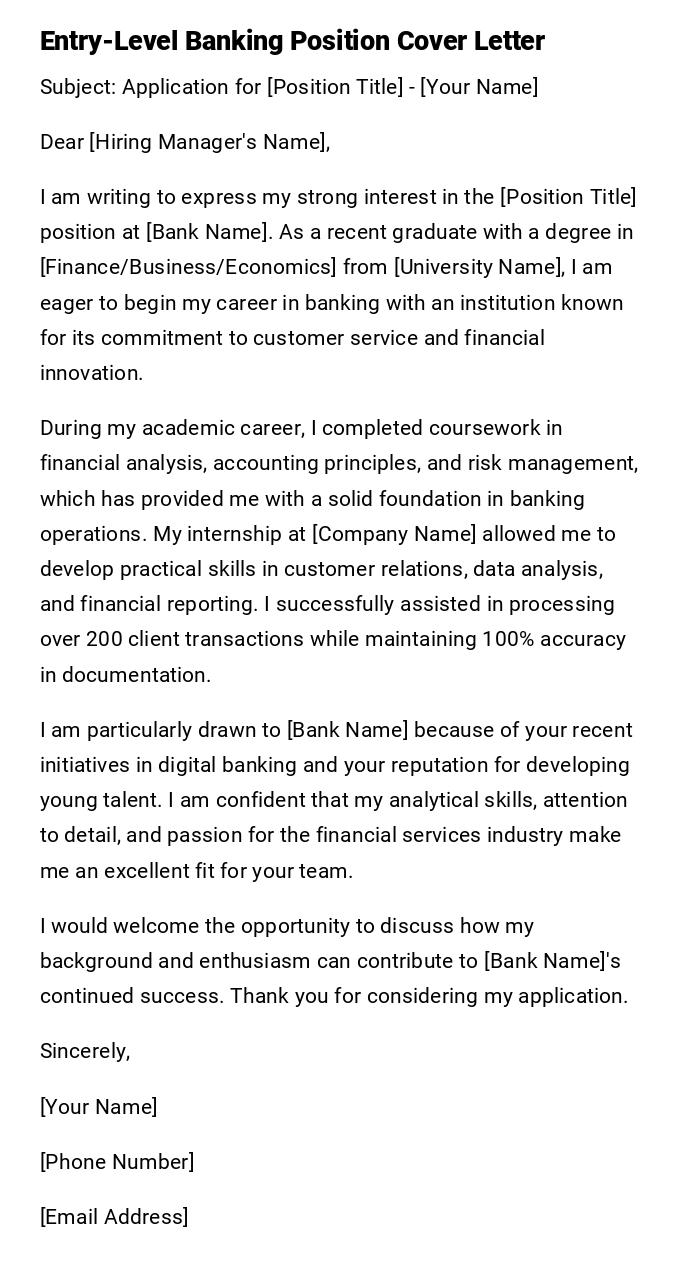
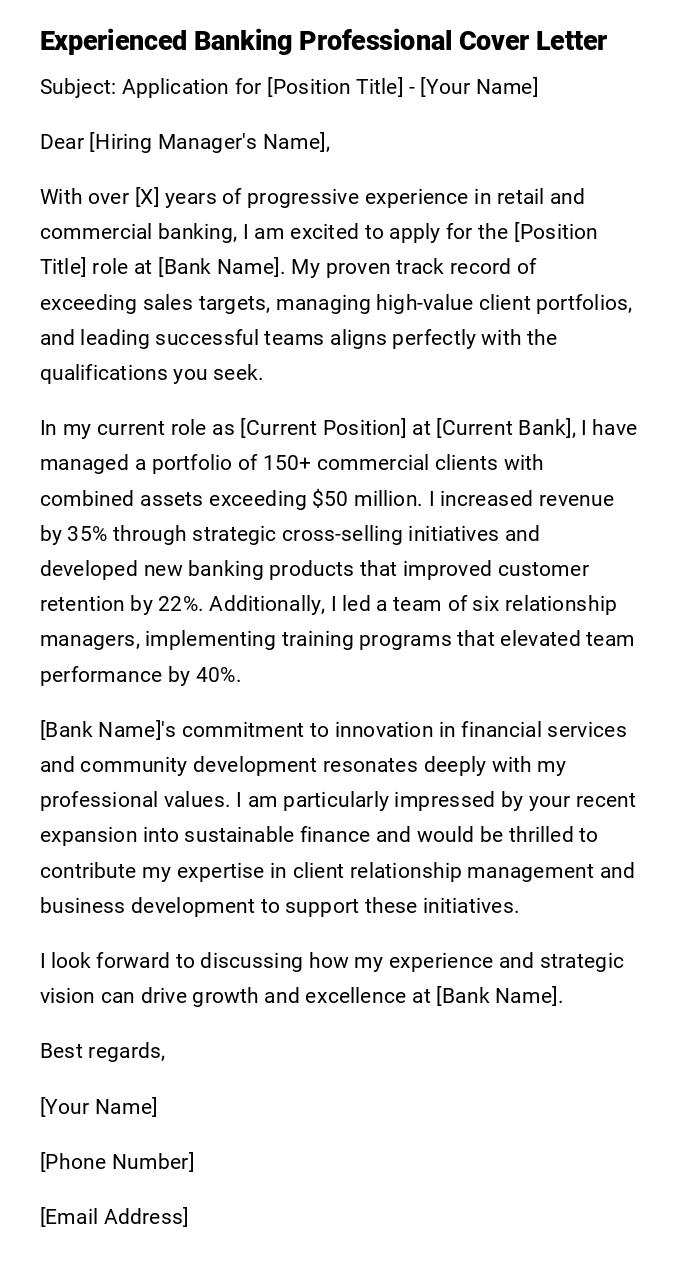
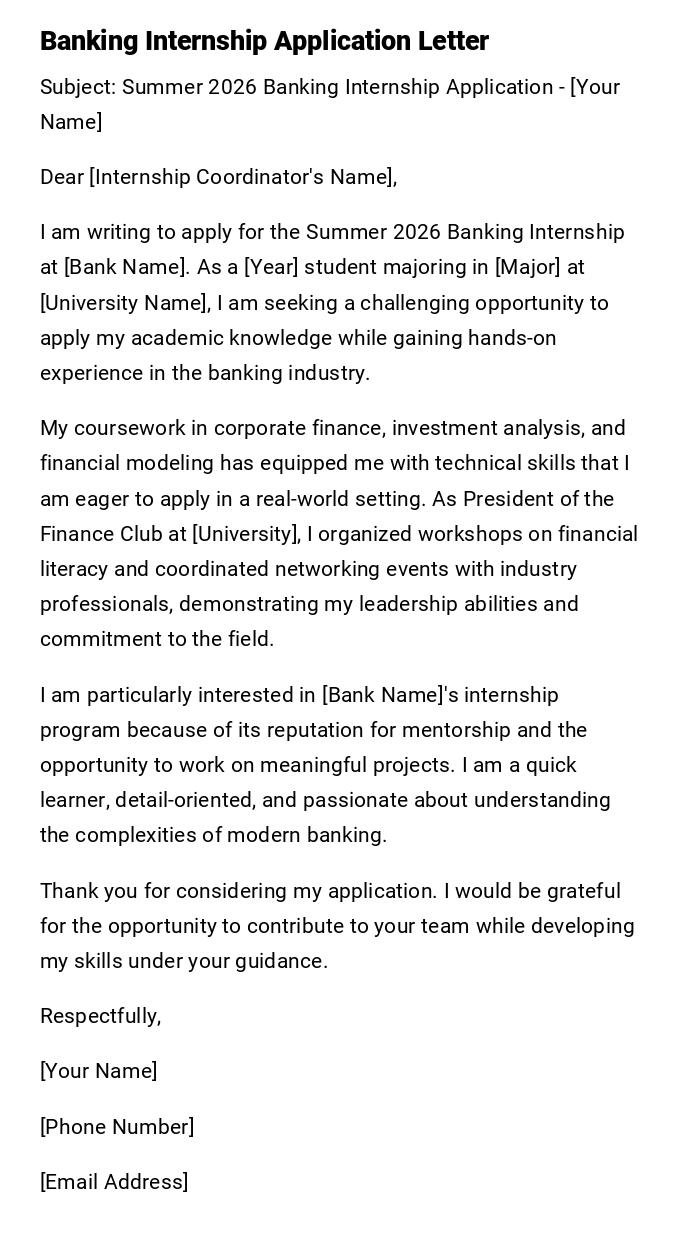
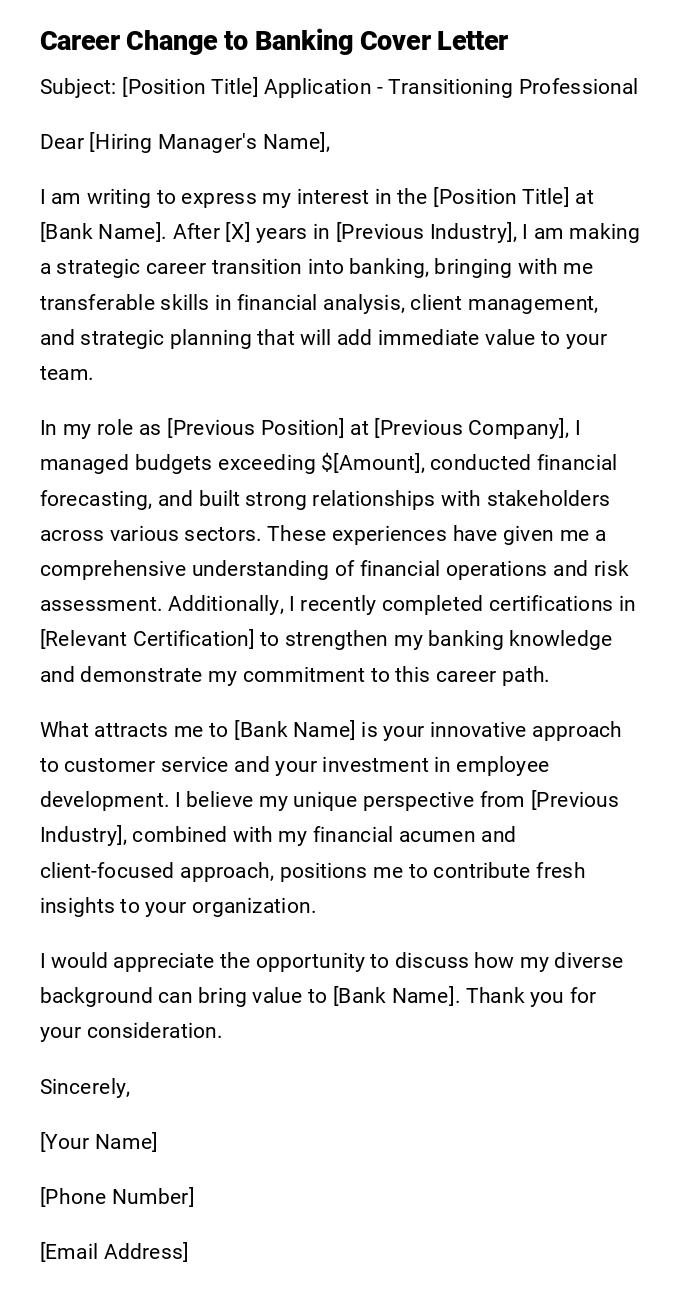
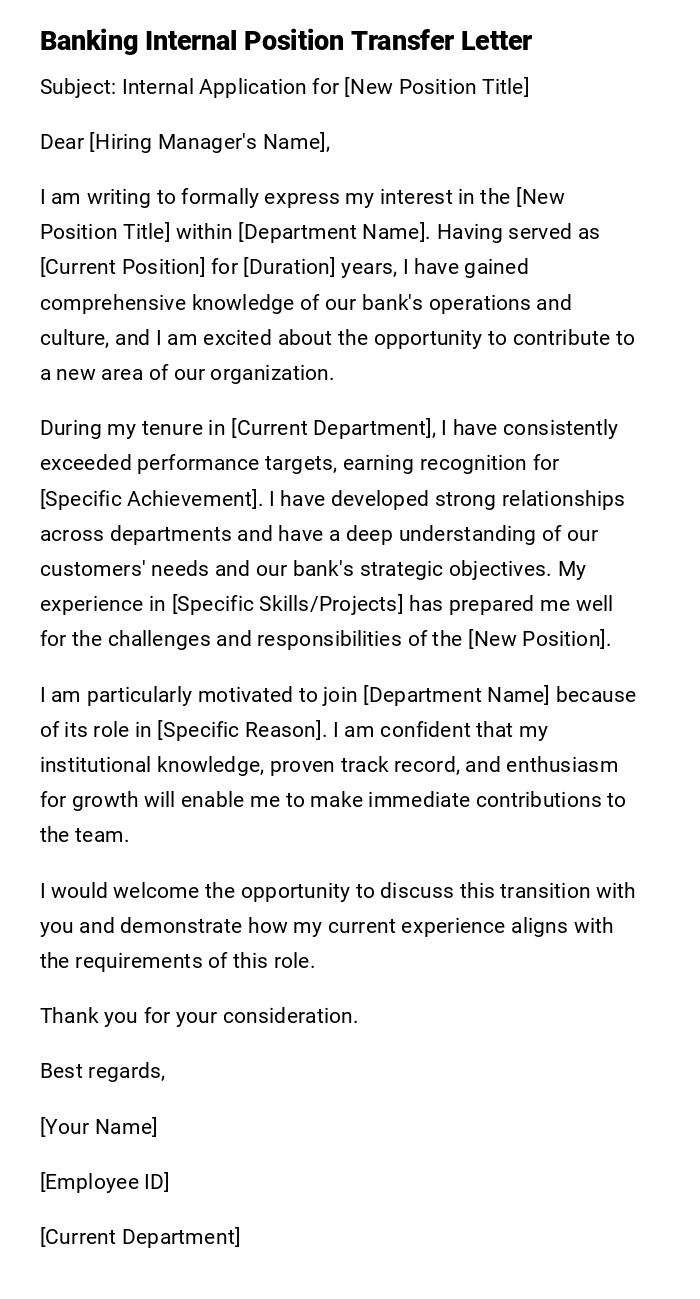
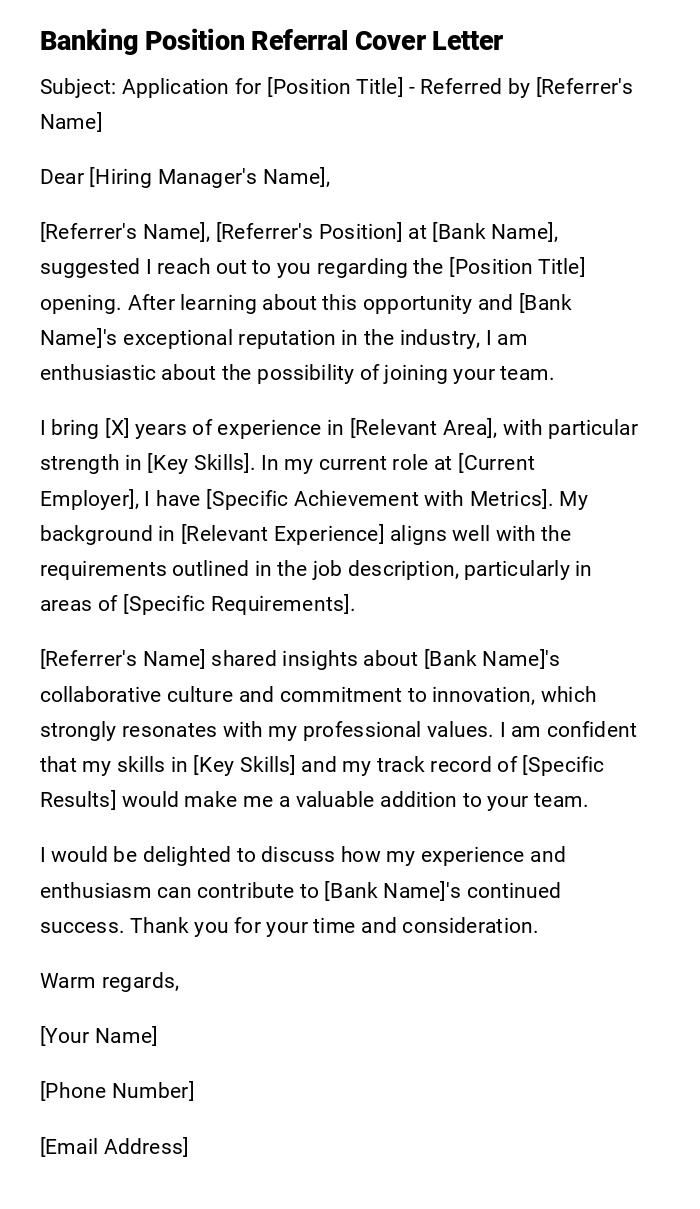
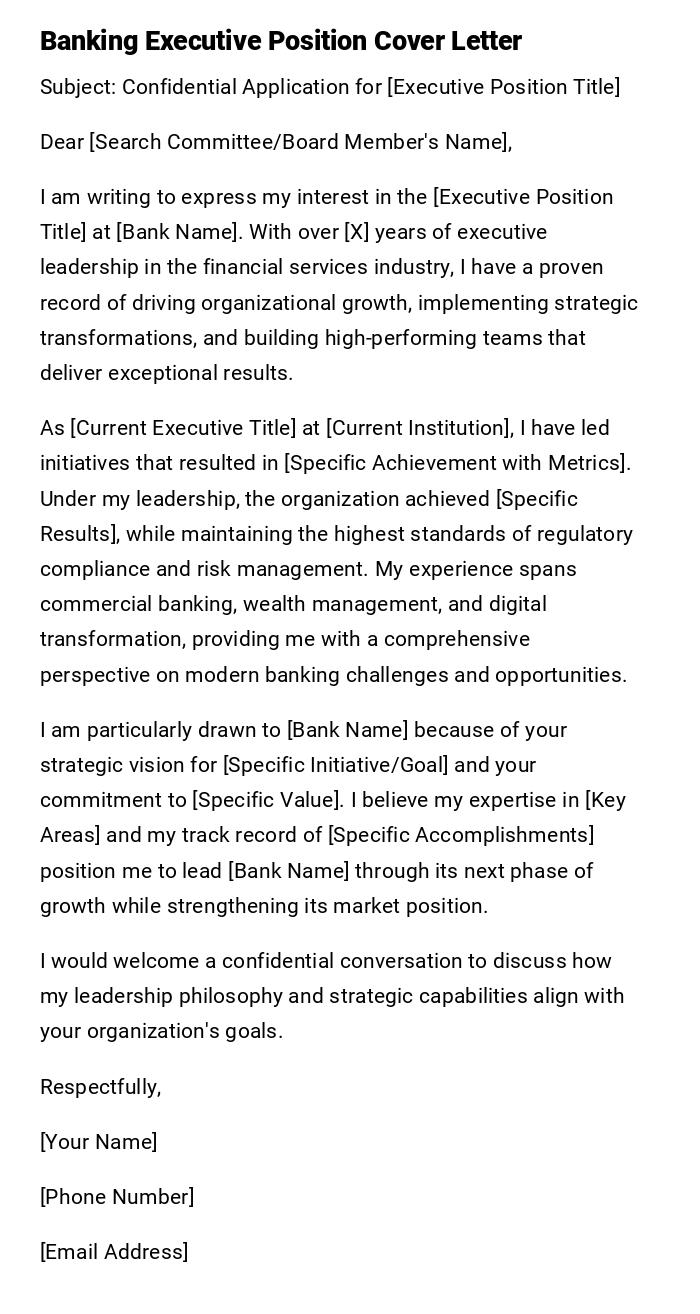

 Download Word Doc
Download Word Doc
 Download PDF
Download PDF